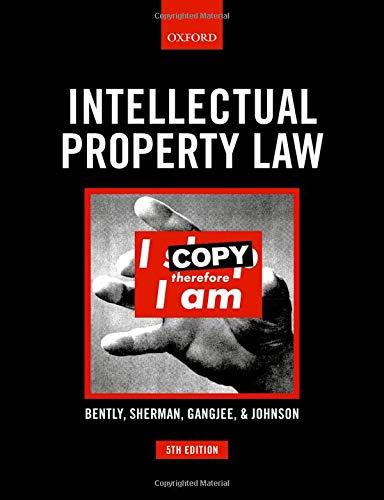Question
Activity 1: Choose the correct answer. 1.These statements are presented to you: I.A limited partner cannot receive or hold as collateral security any partnership property
Activity 1: Choose the correct answer.
1.These statements are presented to you:
I.A limited partner cannot receive or hold as collateral security any partnership property
II.A limited partner cannot receive from general partner or the partnership any conveyance or release from liability, if partnership assets are not sufficient to discharge partnership liabilities to outside creditors.
In your evaluation of the foregoing statements:
a.Both statements are true
b.Both statements are false
c.Only statement I is true
d.Only statement II is true
2.Who between a limited partner and a general party may receive on account of resulting claims against the partnership, with general creditors, a pro rata share of the partnership assets?
a.Both limited partner and general partner
b.Limited partner only
c.General partner only
d.Neither general partner nor limited partner
3.Which of the following will not cause the automatic dissolution of a limited partnership?
a.Insanity of a general partner
b.Civil interdiction of a limited partner
c.Death of a general partner
d.Insolvency of a general partner
4.If there are several limited partners, which of the following may be agreed upon by the members of the partnership?
a.Priority of one or some of the limited partners over the other limited partners as to the return of their contributions
b.Priority of one or some of the limited partners over the other limited partners as to their compensation by way of income
c.Either (a) or (b), or both (a) and (b) or any other priority
d.None of the foregoing since any agreement as to any priority is void because the limited partners must have equal rights and privileges.
5.These statements are presented to you:
I.As a rule, a limited partner is not a proper party to proceedings by or against a partnership
II.A limited partner may, however, be a proper part if the object of the proceeding is to enforce a limited partner's right against the partnership or a limited partner's liability to the partnership.
In your evaluation of the foregoing statements:
a.Both statements are true
b.Both statements are false
c.Only statement I is true
d.Only statement II is true
6.Where all the partners are general partners
a.General Partnership
b.Partnership by estoppels
c.Partnership de facto
d.Limited Partnership
Activity 2: Choose the correct answer and justify
1.I. It is settled that unissued stocks may not be voted or considered in determining whether a quorum is present in a stockholders' meeting
II. Only stock actually issued and outstanding may be voted.
a.Only I is true
b.Only II is true
c.Both are true
d.Both are false
Answer:
Justification:
2.I. As an exception to quorum, the articles of incorporation or by-laws may provide for a greater majority.
II. Any director or trustee of a corporation may be removed from office.
a.Only I is true
b.Only II is true
c.Both are true
d.Both are false
Answer:
Justification:
3.I. Immediately after the election, the directors of a corporation must formally organize and elect, among others, a treasure, who must be a resident of the Philippines.
II. The officer shall manage the corporation and perform such duties as may be provided in the bylaws and/or as resolved by the board of directors.
a.Only I is true
b.Only II is true
c.Both are true
d.Both are false
Answer:
Justification:
4.I. The corporation may only acquire its own stocks in the presence of unrestricted retained earnings.
II. Preferred shares may be acquired even without surplus profit for as long as it will not result to the insolvency of the corporation
a.Only I is true
b.Only II is true
c.Both are true
d.Both are false
Answer:
Justification:
5.I. The requirement of unrestricted retained earnings to cover the shares is based on the doctrine of limited capacity
II. There can be no distribution of assets among the stockholders without first paying corporate creditors. Hence, any disposition or corporate funds to the prejudice of the creditor is rescissible.
a.Only I is true
b.Only II is true
c.Both are true
d.Both are false
Answer:
Justification:
6.I. After incorporation, the by-laws must be signed and approved by all the incorporators and filled with the SEC together with the articles of incorporators.
II. Before incorporation, the affirmative vote of the stockholders representing at least a majority of the outstanding capital stock or of at least a majority of the members shall be necessary.
a.Only I is true
b.Only II is true
c.Both are true
d.Both are false
Answer:
Justification:
7.I. The general rule is that, every member of a non-stock corporation and every legal owner of shares in a stock corporation has the right to be present and to vote in all corporate meetings
II. Voting may be expressed personally, or through proxies who vote in their representative capacities or when so authorized in the by-laws through remote communication or in absentia.
a.Only I is true
b.Only II is true
c.Both are true
d.Both are false
Answer:
Justification:
8.I. An action of the board of directors during the meeting, which was illegal for lack of notice, may not be ratified.
II. Notice of meeting may be waived, expressly or impliedly, by any stockholder or member
a.Only I is true
b.Only II is true
c.Both are true
d.Both are false
Answer:
Justification:
Step by Step Solution
There are 3 Steps involved in it
Step: 1

Get Instant Access to Expert-Tailored Solutions
See step-by-step solutions with expert insights and AI powered tools for academic success
Step: 2

Step: 3

Ace Your Homework with AI
Get the answers you need in no time with our AI-driven, step-by-step assistance
Get Started


